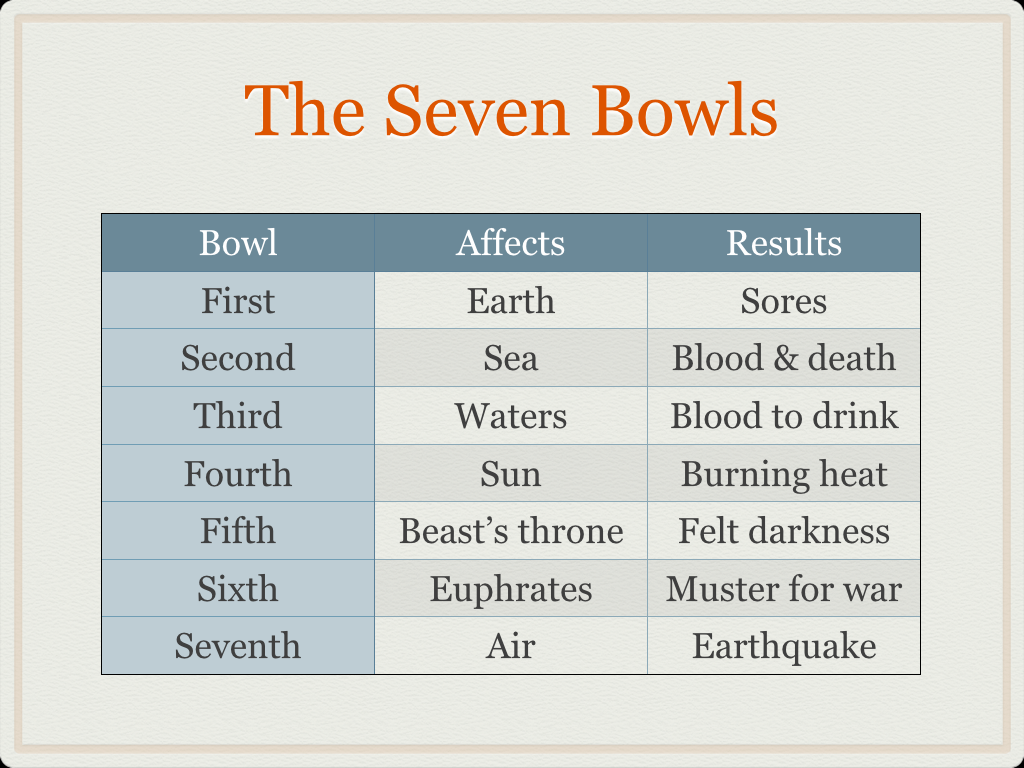
The third of six murals in the 1960s St Benet’s Chaplaincy, Queen Mary’s, University of London. Painted by Adam Kossowski. Courtesy of the Art + Christianity Enquiry (ACE) Trust.
As a message of judgment, the drama of the Apocalypse is as challenging as it is comforting. In his letters to the churches Christ suffers with them, but sees their sins. In his seals and trumpets he says that redemption is coming, but good people will die. In Act IV, he says that the dragon has been defeated, but still the one behind the curtain of Rome’s audacious claims to complete power. And in the seven bowls, God’s righteous judgment finally comes in its terrifying splendor—and he tells the churches it’s because of their prayers.
Primasius captures this well in his Commentary on the Apocalypse: “The very same bowls are said to hold both the sweetness of supplication and the wrath of destruction, for [prayers] are poured out from the saints for the coming of the kingdom of God, at which time the judgments of God will no longer be hidden” (15.7, ACCS; see Mat 6:10). So in the Redemption Chorus, John sees his people’s worship rising reverently into heaven, where both Father and Son can hear their songs and smell their prayers (Rev 5:8; Psa 141:2). But just three chapters later, these same embers are being poured out on God’s enemies: “Then the angel took the censer and filled it with fire from the altar and threw it on the earth, and there were peals of thunder, rumblings, flashes of lightning, and an earthquake” (Rev 8:5 ESV).
Even when the heavenly host sings praise to Christ, there are hints of judgment in their song: “Now the salvation and the power and the kingdom of our God and the authority of his Christ have come, for the accuser of our brothers has been thrown down, who accuses them day and night before our God” (Rev 12:10; see 7:10-12). And as with Satan, so with his minions: our deliverance means their destruction, God’s power means their perdition, his kingdom means their calamity, his authority means their assault, the accusers have become the accused. So as we often sing, it will be a bright day for some, a sad day for many—but a great day for the justice of the Lord.
But how can kind, godly people pray for another’s destruction? Surely, we can pray for deliverance from trial and tribulation, but what about, “Love your enemies and pray for those who persecute you” (Mat 5:44)? Peter Leithart asked this question recently in light of the ongoing turmoil in the Middle East:
But how should we pray?
Like this? “Break their teeth in their mouth, O God! Break out the fangs of the young lions, O Lord! Let them be like a snail which melts away as it goes, like a stillborn child of a woman, that they may not see the sun.”
Or this? “Let his days be few, and let another take his office. Let his children be fatherless, and his wife a widow. Let his children continually be vagabonds, and beg; let them seek their bread also from their desolate places.”
Or this? “Rise up, O Lord, confront them, bring them down; rescue them from the wicked by your sword.” Or, “Repay them for their deeds and for their evil work; repay them for what their hands have done and bring back upon them what they deserve.” Or, “Contend, O Lord, with those who contend with me; fight against those who fight against me. Take up shield and buckler; arise and come to their aid.”
All, of course, are from the Psalter—Psalms 58, 109, 17, 28, and 35 respectively. Examples could be multiplied almost indefinitely. Scholars speak of “imprecatory Psalms” as a sub-class within the Psalter, but page through the Psalter for a moment and you’ll find that many Psalms include petitions asking the Lord to judge, curse, defeat, and defend. (Leithart)
So as the Lord himself says, “Vengeance is mine, I will repay” (Rom 12:19; see 12:14-21), and repay Rome he does. Just as in Egypt, the Lord has seen the oppression of his people and heard their prayers, and he will now deliver them from the house of bondage (Exo 3:7-10). His purpose thus remains the same as before: to be known as the one true God, and to give his enemies an opportunity to repent (Exo 7:1-5; Luke 13:3, 5). To this end, even the plagues reprise their roles: the sores (Exo 9:1-7), the blood (7:14-25), the darkness (10:21-29), the frogs (8:1-15), the hail (9:13-35)—together with a scorching sun. But, like Pharaoh before her, Rome does not repent (Rev 16:9, 11, 21; 9:20-21; see Exo 4:21; 8:19), so she would be defeated in battle (Rev 16:16; 17:14), her borders would be overrun (16:12; 9:13-19), and her empire would fall (16:19-20; 4:12-17; Dan 2:41-45).
The real battle we face as Christians, though, has never been a carnal conflict; it is a war for souls. So John tells the churches of Asia to prepare for the battle, not by arming themselves to the teeth, but by staying alert and keeping their garments white (Rev 16:15; see Mat 22:12-13; 24:42-43). Their battle would not won by feat of arms, but by the spiritual weapons of the Lord’s arsenal: truth, righteousness, the gospel of peace, faith, salvation, God’s word, and prayer (Eph 6:12-18). And as Leithart points out, such prayerful preparation is vital for every generation of Christians, because we know that when we pray for judgment, the Lord hears:
We live in a world where ISIS warriors behead Christians and release the film. We need an earthquake, and we should pray for it: “How long, holy and true, will you refrain from judging and avenging their blood? How long before you do some judging to prove you are Judge?” In the end, the message of the Psalms [and Revelation!—JMB] is Jesus’s post-[Resurrection] message: Fear not. Fear not: There is a God who judges. Fear not: God takes up the cause of the oppressed. Fear not: God raises the dead. (Leithart; see Rev 6:9-11; 1:17-18)
The following files are now available for free viewing and download:
Attachments
- 06 Slides: The Seven Bowls (Rev 16)
Audio Recordings
- Week 30: The Seven Signs and Bowls (15:1-16:9) **Session was not recorded**
- Week 31: The Seven Bowls and The Two Cities (16:10-17:18)
Works Cited
- Ancient Christian Commentary on Scripture. Ed. Thomas C. Oden. InterVarsity, 2003. Accordance.
- The ESV Study Bible. Ed. Lane T. Dennis & Wayne Grudem. Crossway, 2008. Accordance.
- Leithart, Peter J. “Teach Us to Pray.” 24 Apr. 2015. First Things. Web. 7 Jun. 2015.
Cross-posted from In His Image.





